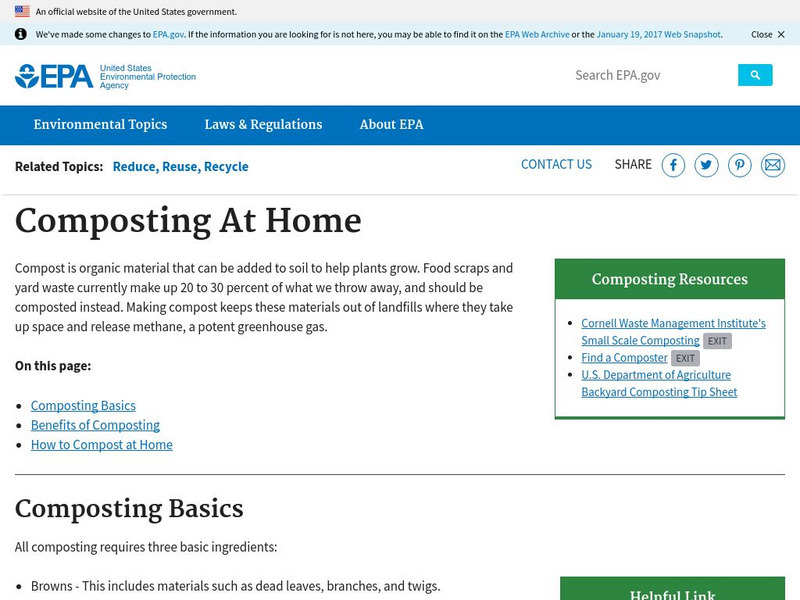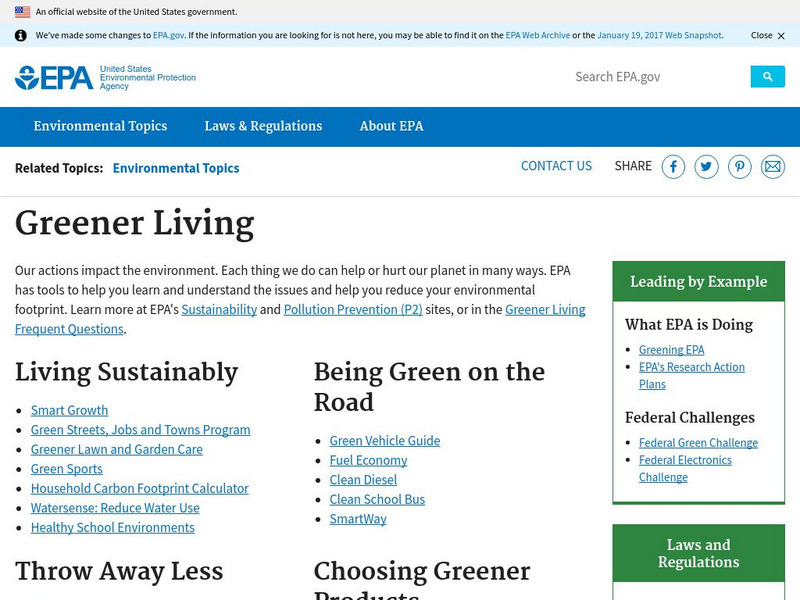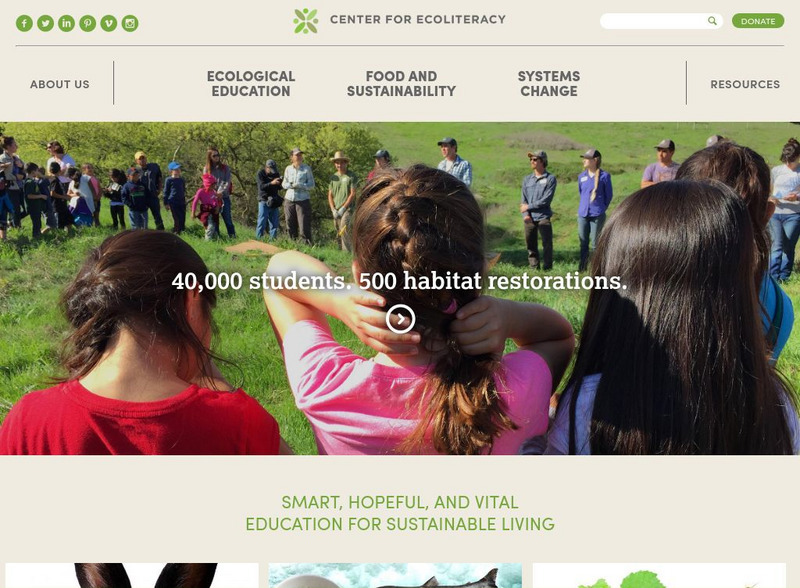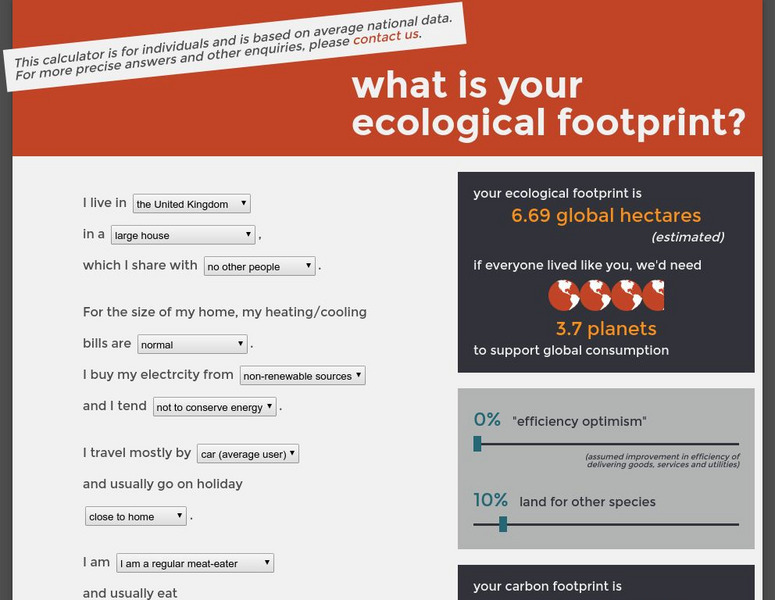US Environmental Protection Agency
Epa: Great Lakes
The EPA profiles the Great Lakes ecosystem, their ecological protection and restoration, wetlands, shorelands, pollution prevention, and so on. Click "Visualizing the Great Lakes" for pictures of the lake environment.
TeachEngineering
Teach Engineering: A Guide to Rain Garden Construction
Student groups create personal rain gardens planted with native species to provide a green infrastructure and low-impact development technology solution for areas with poor drainage that often flood during storm events.
US Environmental Protection Agency
Epa: Composting at Home
Investigate the benefits of composting and discover ways to do it easily at home.
Other
Florida Dept. Of Education: Conservation of Renewable and Nonrenewable Resources
In this learning module, students learn to differentiate between renewable and nonrenewable resources, and identify resources that fit into each category. It explains the environmental effects of using nonrenewable resources, such as...
Other
Grace Communications Foundation: Energy Program
Promoting responsible energy choices and environmentally conscious government policies, NNEC provides information on energy and agriculture, the nexus of energy and water, complexities of power plants, natural gas fracking, energy...
World Wildlife Fund for Nature
Wwf: Climate Change
The World Wildlife Fund is an environmental organization that spans the globe. This website looks at the organization's efforts and education on climate change and global warming issues. Students can get involved with tracking particular...
Alabama Learning Exchange
Alex: It Is Easy Being "Green" Part I of Iii
For this two-day lesson, students will learn what "Going Green" means, including how to utilize sustainable resources. Students will work in groups (selected at random) and research pros and cons of changing their lifestyle. This is the...
US Environmental Protection Agency
Epa: Learn the Issues: Green Living
This site provides real-world issues as well as the scientific research and technology used to support the EPA's mission to protect human health and safeguard the natural environment.
Other
Center for Ecoliteracy
Learn of an organization that is providing support to educators to teach ecologically sustainable skills to children. Includes details on grants, resources, and projects.
US Environmental Protection Agency
Epa: Exploring Estuaries
Find click-through tours of estuaries in New York and in Louisiana that provide sustained reading on the science of river deltas. Text is supported by illustrations and a glossary of special terms.
PBS
Pbs Teachers: Scientific American: Future Car: Fuel Cells
Investigate the innovations surrounding fuel cell technology and the potential use of hydrogen as an automobile power source. Generate hydrogen gas by splitting water in a process called electrolysis.
Science Education Resource Center at Carleton College
Serc: Mining: Least Cost Lab
Students will explore the basic cost of mining, transportation and manufacturing activities under the concept of Weber's least-cost theory. The goal of this activity is to simulate a basic cost analysis of ore mining and optimal location...
Other
Oecd: Millennium Development Goals [Pdf]
This site is a list of goals and targets set forth for the new Millennium as decided by the Millennium Declaration which was signed by 189 countries worldwide. Some of the goals involve topics such as improving primary education,...
Other
Trees for the Future
Trees for the Future promotes and supports reforestation and environmentally sustainable land use, in cooperation with local groups and individuals in their own communities around the world.
abcteach
Abcteach: Earth Day Activities
[Free Registration/Login Required] How can you treat the earth with more respect? Check out this resource featuring links to elementary activities to celebrate Earth Day. You will find word searches, crossword puzzles, reading...
Other
K 3 Learning pages.com: Earth Day Links
How can you celebrate Earth Day in your classroom? This collection features several downloadable Earth Day worksheets including word searches and coloring pages. Students and teachers can plan the perfect way to recognize the environment.
Energy4Me
Energy4me: Energy Challenges
Read about the challenges of global energy use and consumption, and what solutions exist for today's engineers.
Eduweb
Educational Web Adventures: The Ecotourism Game
Will ecotourism help preserve the rainforest? Decide what to do and read the consequences.
Other
Planeta: Challenge of Ecotourism: A Call for Higher Standards
Article provides guidelines for ecotourism, definitions for nature-based tourism, current usage of ecotourism, , ten commandments on ecotourism, and more.
National Geographic
National Geographic: Natural Gas: A Cleaner Energy Solution?
For this activity, students read informational text on natural gas and compare it to other fossil fuels for its greenhouse gas emissions and environmental impact. They then prepare a pro or con position on whether natural gas is good...
Other
Counterpart International: Counterpart
Non-profit organization that focuses on humanitarian and relief assistance, education, healthcare, democracy and governance, food security, development, and more. Their mission is "giving people a voice in their own future through smart...
Other
Evergreen
A national charity created to turn schools into green space that celebrate the environment, as well as preserve natural outdoor spaces within Canadian cities, Evergreen has core programs: Learning Grounds - transforming school grounds,...
Other
Best Foot Forward: Ecological Footprint Calculator
Measure your ecological footprint, and see how many land and resources you use in your everyday life. Find out how your choices affect the natural world, and then find ways to make changes in your lifestyle to help the environment.
Science Education Resource Center at Carleton College
Serc: Using "Good Guide" to Create Better Consumers
This learning activity helps educators and learners use a valuable web resource that ranks products based on three sustainability criteria: personal health, environmental impact, and social equity.























